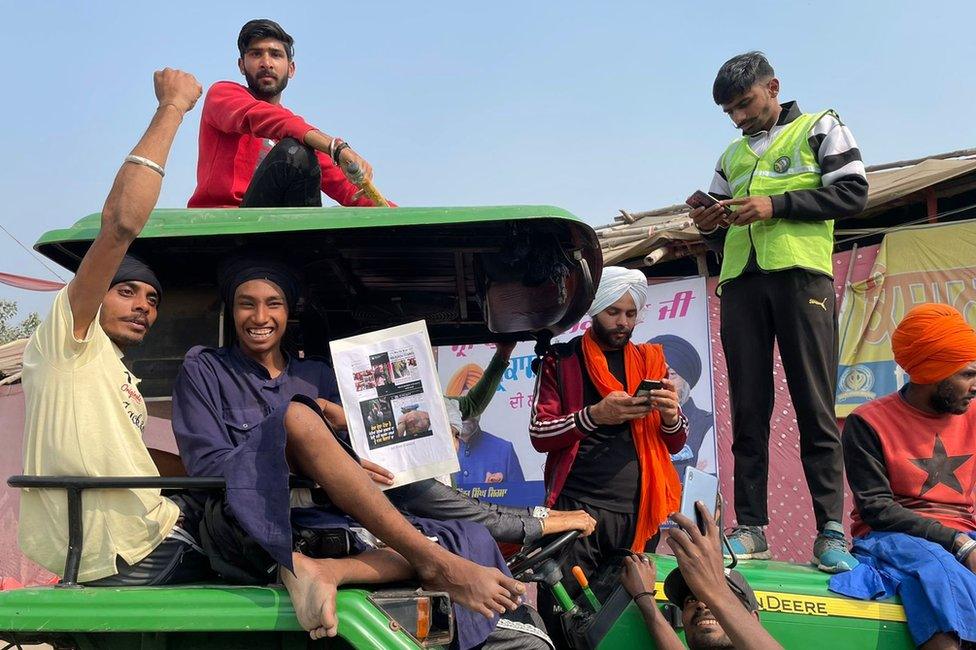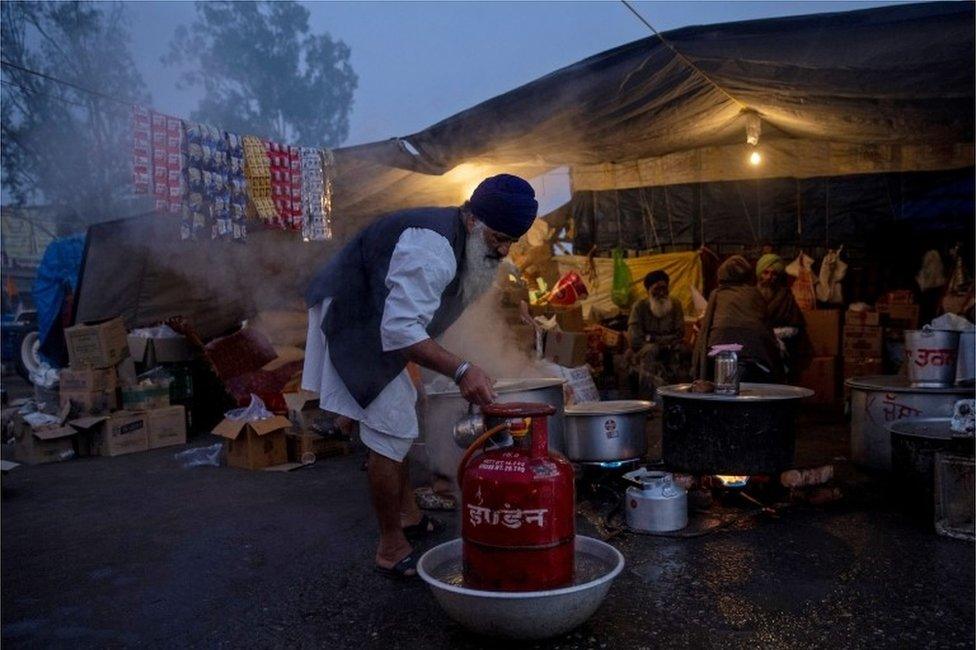Farm laws: India PM Narendra Modi repeals controversial reforms
- Published
Farmers celebrating the repeal of controversial laws
Indian PM Narendra Modi has announced the repeal of three controversial farm laws after a year of protests.
Thousands of farmers had camped at Delhi's borders since last November and dozens died from heat, cold and Covid.
Farmers say the laws will allow the entry of private players in farming and that will hurt their income.
Friday's surprise announcement marks a major U-turn as the government had not taken any initiative to talk to farmers in recent months.
And Mr Modi's ministers have been steadfastly insisting that the laws were good for farmers and there was no question of taking them back.
Farm unions are seeing this as a huge victory. But experts say the upcoming state elections in Punjab and Uttar Pradesh - both have a huge base of farmers - may have forced the decision.
The announcement on Friday morning came on a day Sikhs - the dominant community in Punjab - are celebrating the birth anniversary of Guru Nanak, the founder of Sikhism.
In his nationally-televised address, Mr Modi said the farm laws were meant to strengthen the small farmers. "But despite several attempts to explain the benefits to the farmers, we have failed. On the occasion of Guru Purab, the government has decided to repeal the three farm laws," he added.
What did the laws offer?
Taken together, they loosened rules around sale, pricing and storage of farm produce - rules that have protected India's farmers from the free market for decades.
One of the biggest changes was that farmers were allowed to sell their produce at a market price directly to private players - agricultural businesses, supermarket chains and online grocers. Most Indian farmers currently sell the majority of their produce at government-controlled wholesale markets or mandis at assured floor prices (also known as minimum support price or MSP).

The farmers were protesting on motorways connecting Delhi to other states
The laws allowed private buyers to hoard food like rice, wheat and pulses for future sales, which only government-authorised agents could do earlier.
The reforms, at least on paper, gave farmers the option of selling outside of this so-called "mandi system". But the protesters said the laws would weaken the farmers and allow private players to dictate prices and control their fate. They said the MSP was keeping many farmers going and without it, many of them will struggle to survive.
They said India's stringent laws around the sale of agricultural produce and high subsidies had protected farmers from market forces for decades and there was no need to change that.
But the government argued that it was time to make farming profitable for even small farmers and the new laws were going to achieve that.
What has the reaction been?
Farmers in Punjab and Haryana are celebrating the news, raising flags of victory and distributing sweets. But they say the fight is not over.
"We have no faith in a verbal promise. Unless we see it in writing that the laws have actually been repealed, we will stay here," Raj Singh Chaudhary, a 99-year-old protester, told the BBC's Salman Ravi.

Farmers celebrating at the Delhi-Singhu border
Mr Chaudhary is among hundreds of farmers who have been striking at the Delhi-Ghazipur border for a year.
His view was echoed by Rakesh Tikait, a prominent farmer leader who said they would call off the protest only after the laws were repealed in the winter session of parliament.
Another farmer leader said they needed additional promises from the government around assured prices for their crops to end their protest.
The announcement has stunned political observers as well as those who both support and oppose the laws - many tweeted saying it was a huge victory for the farmers and a "major climbdown" for Mr Modi.
But some farm leaders and economists who saw merit in the laws have expressed disappointment over their repeal. Anil Ghanwat, head of a farmers' union in western India, said it was an "unfortunate" decision, external driven by political considerations.
Opposition parties welcomed the decision, with Congress party leader Rahul Gandhi calling it "a win against injustice". And West Bengal Chief Minister Mamata Banerjee, took to social media to praise farmers and congratulate them.
BJP members said the decision to repeal the laws had nothing to do with the polls and the decision was taken to end the protest. They did not say if there were plans to bring back the laws in another form later.


Narendra Modi's decision to repeal the contentious farm laws is, at once, a strategic and political move and a belated admission of the government's haste and high-handedness.
The laws had whipped up an unprecedented firestorm of protests in the states of Punjab and Uttar Pradesh and posed a real challenge to Mr Modi. They had mobilised farmers and civil society in Sikh-majority Punjab and spread to parts of Uttar Pradesh, states which will see key elections early next year.
By repealing the laws, Mr Modi hopes to regain the confidence of the farmers in general and Sikhs in particular. It would also boost the BJP's chances in the polls.
Click here to read the full analysis.

What led to the repeal?
The Samyukta Kisan Morcha (SKM), an umbrella group of some 40 farmers' unions, had refused to back down despite appeals from the government to end their protest.
Farmers continued to block motorways to Delhi through harsh winter and summer months and even through deadly Covid waves. They called for strikes across the country and dozens of them even died due to cold, heat and Covid.
The government initially engaged with them and offered to put the laws in abeyance for two years. But after farmers rejected their overtures, the authorities retreated, preferring to go with the wait-and-watch attitude.

Farmers have set up camps on motorways
But two things changed in the last few months.
First, the son of a federal minister allegedly drove his car into a group of protesting farmers in Lakhimpur in Uttar Pradesh in early October. He denied the allegation, but was arrested. Eight people, including four farmers and a journalist, were killed in the incident which sparked outrage across the country and put the government on the back foot.
Second, PM Modi's Bharatiya Janata Party (BJP) is up against strong regional parties in the upcoming elections in Punjab, Uttar Pradesh and Uttarakhand and the government knows that angry farmers would hurt the BJP's chances of winning the crucial polls.

Protesting India farmers brave cold, heat and Covid
